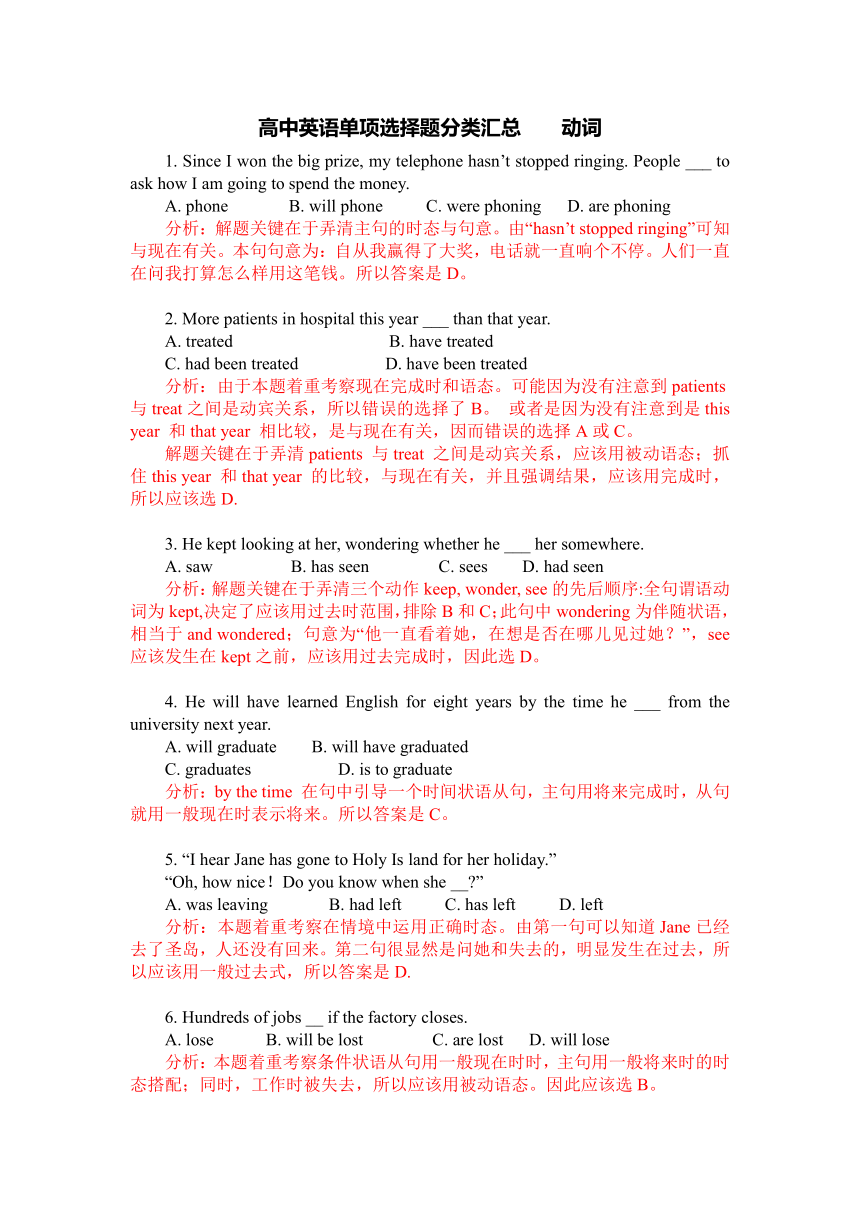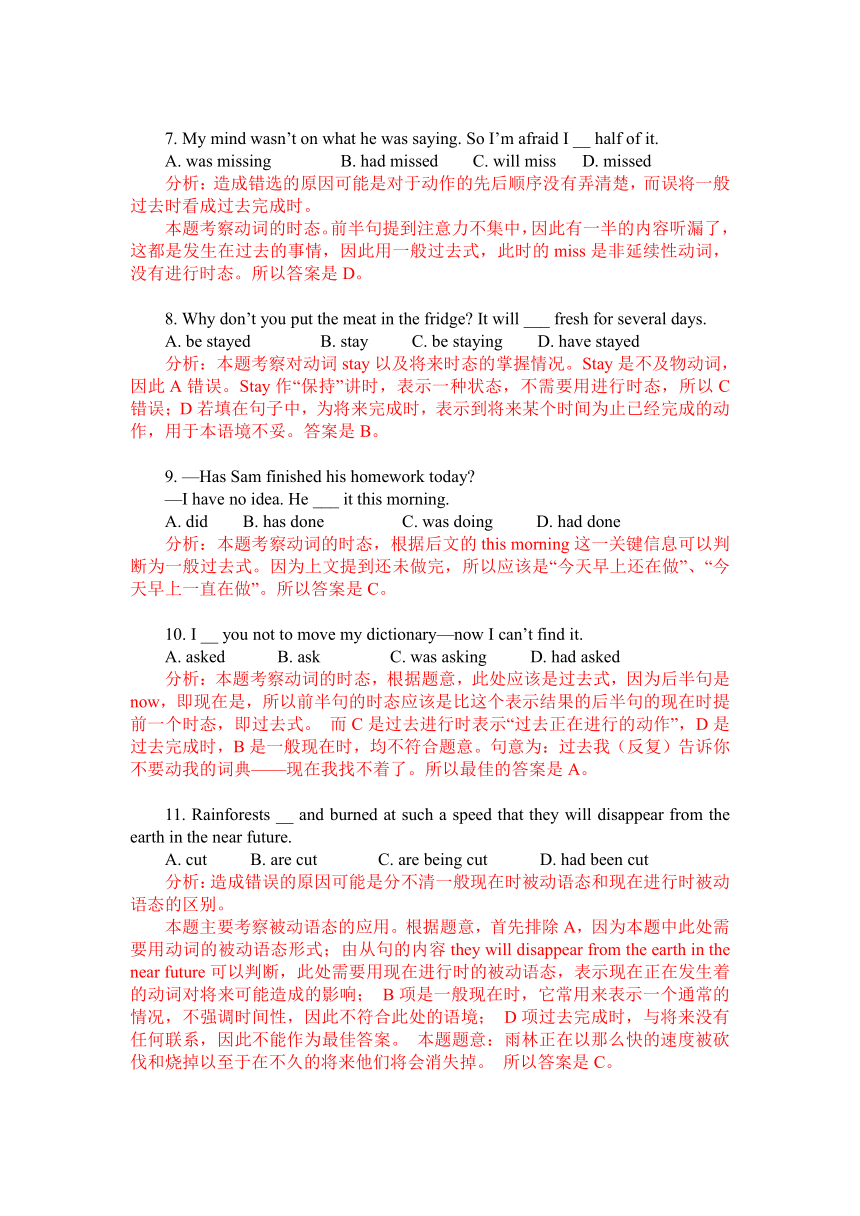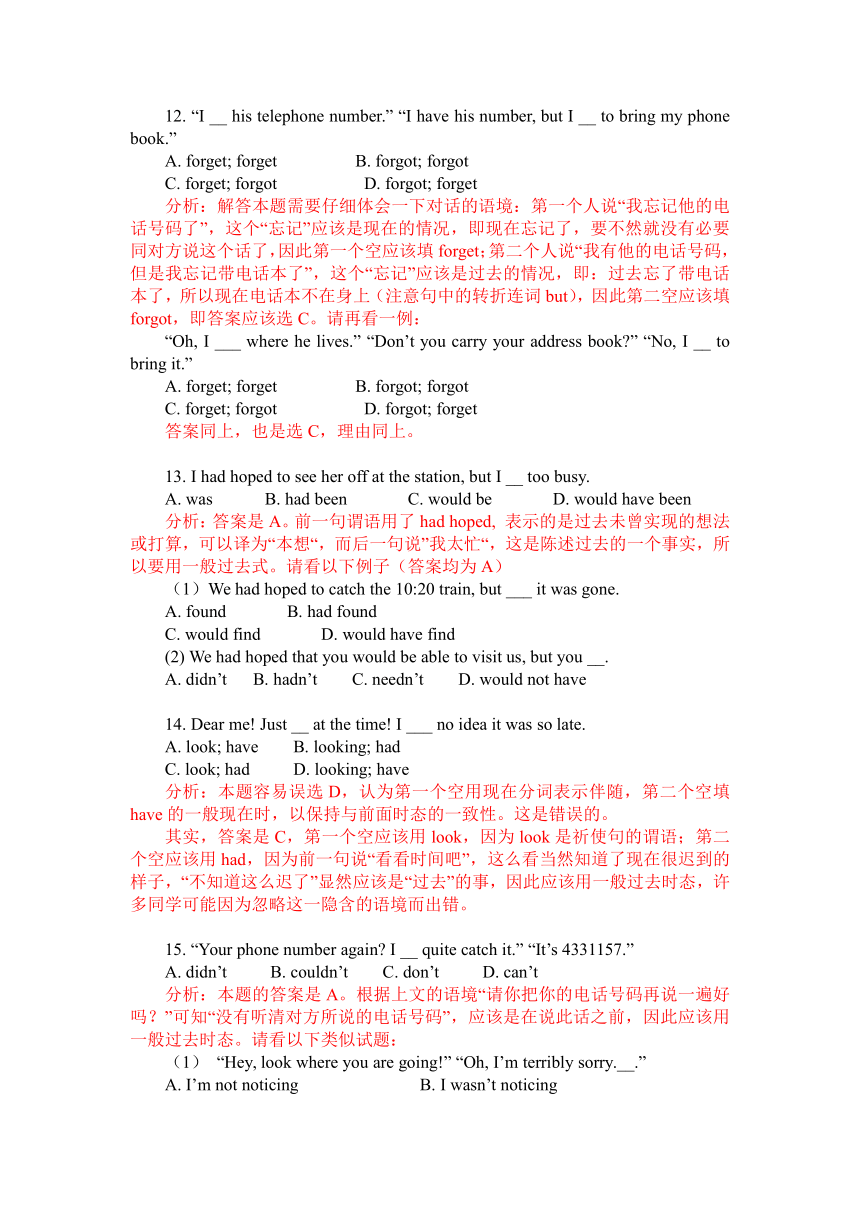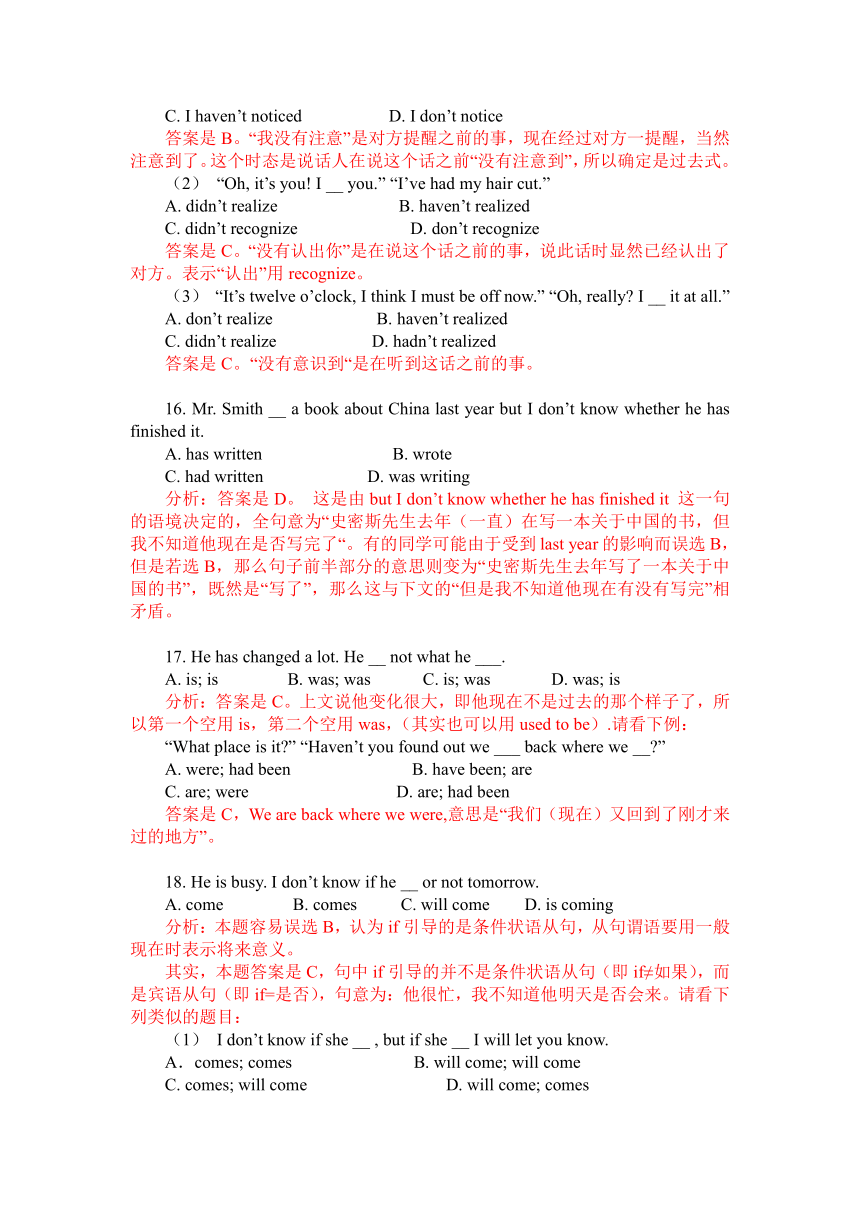高中英语精选单项选择题专练 动词(word版含解析)
文档属性
| 名称 | 高中英语精选单项选择题专练 动词(word版含解析) |  | |
| 格式 | doc | ||
| 文件大小 | 58.0KB | ||
| 资源类型 | 教案 | ||
| 版本资源 | 人教版(2019) | ||
| 科目 | 英语 | ||
| 更新时间 | 2021-05-29 23:34:50 | ||
图片预览




文档简介
高中英语单项选择题分类汇总 动词
1. Since I won the big prize, my telephone hasn’t stopped ringing. People ___ to ask how I am going to spend the money.
A. phone B. will phone C. were phoning D. are phoning
分析:解题关键在于弄清主句的时态与句意。由“hasn’t stopped ringing”可知与现在有关。本句句意为:自从我赢得了大奖,电话就一直响个不停。人们一直在问我打算怎么样用这笔钱。所以答案是D。
2. More patients in hospital this year ___ than that year.
A. treated B. have treated
C. had been treated D. have been treated
分析:由于本题着重考察现在完成时和语态。可能因为没有注意到patients与treat之间是动宾关系,所以错误的选择了B。 或者是因为没有注意到是this year 和that year 相比较,是与现在有关,因而错误的选择A或C。
解题关键在于弄清patients 与treat 之间是动宾关系,应该用被动语态;抓住this year 和that year 的比较,与现在有关,并且强调结果,应该用完成时,所以应该选D.
3. He kept looking at her, wondering whether he ___ her somewhere.
A. saw B. has seen C. sees D. had seen
分析:解题关键在于弄清三个动作keep, wonder, see的先后顺序:全句谓语动词为kept,决定了应该用过去时范围,排除B和C;此句中wondering为伴随状语,相当于and wondered;句意为“他一直看着她,在想是否在哪儿见过她?”,see应该发生在kept之前,应该用过去完成时,因此选D。
4. He will have learned English for eight years by the time he ___ from the university next year.
A. will graduate B. will have graduated
C. graduates D. is to graduate
分析:by the time 在句中引导一个时间状语从句,主句用将来完成时,从句就用一般现在时表示将来。所以答案是C。
5. “I hear Jane has gone to Holy Is land for her holiday.”
“Oh, how nice!Do you know when she __?”
A. was leaving B. had left C. has left D. left
分析:本题着重考察在情境中运用正确时态。由第一句可以知道Jane已经去了圣岛,人还没有回来。第二句很显然是问她和失去的,明显发生在过去,所以应该用一般过去式,所以答案是D.
6. Hundreds of jobs __ if the factory closes.
A. lose B. will be lost C. are lost D. will lose
分析:本题着重考察条件状语从句用一般现在时时,主句用一般将来时的时态搭配;同时,工作时被失去,所以应该用被动语态。因此应该选B。
7. My mind wasn’t on what he was saying. So I’m afraid I __ half of it.
A. was missing B. had missed C. will miss D. missed
分析:造成错选的原因可能是对于动作的先后顺序没有弄清楚,而误将一般过去时看成过去完成时。
本题考察动词的时态。前半句提到注意力不集中,因此有一半的内容听漏了,这都是发生在过去的事情,因此用一般过去式,此时的miss是非延续性动词,没有进行时态。所以答案是D。
8. Why don’t you put the meat in the fridge? It will ___ fresh for several days.
A. be stayed B. stay C. be staying D. have stayed
分析:本题考察对动词stay以及将来时态的掌握情况。Stay是不及物动词,因此A错误。Stay作“保持”讲时,表示一种状态,不需要用进行时态,所以C错误;D若填在句子中,为将来完成时,表示到将来某个时间为止已经完成的动作,用于本语境不妥。答案是B。
9. —Has Sam finished his homework today?
—I have no idea. He ___ it this morning.
A. did B. has done C. was doing D. had done
分析:本题考察动词的时态,根据后文的this morning这一关键信息可以判断为一般过去式。因为上文提到还未做完,所以应该是“今天早上还在做”、“今天早上一直在做”。所以答案是C。
10. I __ you not to move my dictionary—now I can’t find it.
A. asked B. ask C. was asking D. had asked
分析:本题考察动词的时态,根据题意,此处应该是过去式,因为后半句是now,即现在是,所以前半句的时态应该是比这个表示结果的后半句的现在时提前一个时态,即过去式。 而C是过去进行时表示“过去正在进行的动作”,D是过去完成时,B是一般现在时,均不符合题意。句意为:过去我(反复)告诉你不要动我的词典——现在我找不着了。所以最佳的答案是A。
11. Rainforests __ and burned at such a speed that they will disappear from the earth in the near future.
A. cut B. are cut C. are being cut D. had been cut
分析:造成错误的原因可能是分不清一般现在时被动语态和现在进行时被动语态的区别。
本题主要考察被动语态的应用。根据题意,首先排除A,因为本题中此处需要用动词的被动语态形式;由从句的内容they will disappear from the earth in the near future可以判断,此处需要用现在进行时的被动语态,表示现在正在发生着的动词对将来可能造成的影响; B项是一般现在时,它常用来表示一个通常的情况,不强调时间性,因此不符合此处的语境; D项过去完成时,与将来没有任何联系,因此不能作为最佳答案。 本题题意:雨林正在以那么快的速度被砍伐和烧掉以至于在不久的将来他们将会消失掉。 所以答案是C。
12. “I __ his telephone number.” “I have his number, but I __ to bring my phone book.”
A. forget; forget B. forgot; forgot
C. forget; forgot D. forgot; forget
分析:解答本题需要仔细体会一下对话的语境:第一个人说“我忘记他的电话号码了”,这个“忘记”应该是现在的情况,即现在忘记了,要不然就没有必要同对方说这个话了,因此第一个空应该填forget;第二个人说“我有他的电话号码,但是我忘记带电话本了”,这个“忘记”应该是过去的情况,即:过去忘了带电话本了,所以现在电话本不在身上(注意句中的转折连词but),因此第二空应该填forgot,即答案应该选C。请再看一例:
“Oh, I ___ where he lives.” “Don’t you carry your address book?” “No, I __ to bring it.”
A. forget; forget B. forgot; forgot
C. forget; forgot D. forgot; forget
答案同上,也是选C,理由同上。
13. I had hoped to see her off at the station, but I __ too busy.
A. was B. had been C. would be D. would have been
分析:答案是A。前一句谓语用了had hoped, 表示的是过去未曾实现的想法或打算,可以译为“本想“,而后一句说”我太忙“,这是陈述过去的一个事实,所以要用一般过去式。请看以下例子(答案均为A)
(1)We had hoped to catch the 10:20 train, but ___ it was gone.
A. found B. had found
C. would find D. would have find
(2) We had hoped that you would be able to visit us, but you __.
A. didn’t B. hadn’t C. needn’t D. would not have
14. Dear me! Just __ at the time! I ___ no idea it was so late.
A. look; have B. looking; had
C. look; had D. looking; have
分析:本题容易误选D,认为第一个空用现在分词表示伴随,第二个空填have的一般现在时,以保持与前面时态的一致性。这是错误的。
其实,答案是C,第一个空应该用look,因为look是祈使句的谓语;第二个空应该用had,因为前一句说“看看时间吧”,这么看当然知道了现在很迟到的样子,“不知道这么迟了”显然应该是“过去”的事,因此应该用一般过去时态,许多同学可能因为忽略这一隐含的语境而出错。
15. “Your phone number again? I __ quite catch it.” “It’s 4331157.”
A. didn’t B. couldn’t C. don’t D. can’t
分析:本题的答案是A。根据上文的语境“请你把你的电话号码再说一遍好吗?”可知“没有听清对方所说的电话号码”,应该是在说此话之前,因此应该用一般过去时态。请看以下类似试题:
(1) “Hey, look where you are going!” “Oh, I’m terribly sorry.__.”
A. I’m not noticing B. I wasn’t noticing
C. I haven’t noticed D. I don’t notice
答案是B。“我没有注意”是对方提醒之前的事,现在经过对方一提醒,当然注意到了。这个时态是说话人在说这个话之前“没有注意到”,所以确定是过去式。
(2) “Oh, it’s you! I __ you.” “I’ve had my hair cut.”
A. didn’t realize B. haven’t realized
C. didn’t recognize D. don’t recognize
答案是C。“没有认出你”是在说这个话之前的事,说此话时显然已经认出了对方。表示“认出”用recognize。
(3) “It’s twelve o’clock, I think I must be off now.” “Oh, really? I __ it at all.”
A. don’t realize B. haven’t realized
C. didn’t realize D. hadn’t realized
答案是C。“没有意识到“是在听到这话之前的事。
16. Mr. Smith __ a book about China last year but I don’t know whether he has finished it.
A. has written B. wrote
C. had written D. was writing
分析:答案是D。 这是由but I don’t know whether he has finished it 这一句的语境决定的,全句意为“史密斯先生去年(一直)在写一本关于中国的书,但我不知道他现在是否写完了“。 有的同学可能由于受到last year的影响而误选B,但是若选B,那么句子前半部分的意思则变为“史密斯先生去年写了一本关于中国的书”,既然是“写了”,那么这与下文的“但是我不知道他现在有没有写完”相矛盾。
17. He has changed a lot. He __ not what he ___.
A. is; is B. was; was C. is; was D. was; is
分析:答案是C。上文说他变化很大,即他现在不是过去的那个样子了,所以第一个空用is,第二个空用was,(其实也可以用used to be).请看下例:
“What place is it?” “Haven’t you found out we ___ back where we __?”
A. were; had been B. have been; are
C. are; were D. are; had been
答案是C,We are back where we were,意思是“我们(现在)又回到了刚才来过的地方”。
18. He is busy. I don’t know if he __ or not tomorrow.
A. come B. comes C. will come D. is coming
分析:本题容易误选B,认为if引导的是条件状语从句,从句谓语要用一般现在时表示将来意义。
其实,本题答案是C,句中if引导的并不是条件状语从句(即if≠如果),而是宾语从句(即if=是否),句意为:他很忙,我不知道他明天是否会来。请看下列类似的题目:
(1) I don’t know if she __ , but if she __ I will let you know.
A.comes; comes B. will come; will come
C. comes; will come D. will come; comes
答案是D。第一个is引导的是宾语从句,第二个if引导的是条件状语从句。
(2)“When __ he come?” “I don’t know, but when he __, I’ll tell you.”
A. does; comes B. will; will come
C. does; will come D. will; come
答案是D。第一个when是疑问副词,用于引出一个特殊疑问句;第二个when是从属连词,用于引导时间状语从句。
(3) “When he __ is not known yet.” “But when he __, he will be warmly welcomed.”
A. comes; comes B. will come; will come
C. comes; will come D. will come; comes
分析:答案是D。第一个when引导的是主语从句,第二个when引导的是时间状语从句。
19. The bridge, which ___ 1688, needs repairing.
A. is dated from B. was dated from
C. dates from D. dated from
分析:答案是C。因为date from的意思是“自某时起存在至今”,(=have existed since),它通常用于一般现在时,而不用于过去时态(尽管它后面接的总是表示过去的时间)。如:
The church dates from 1176. 这座教堂是1176年建造的。
The castle dates from the 14th century. 这座城堡是14世纪建造的。
但是若所谈论的东西现在已经不复存在,则可以用一般过去式。如:
The church, which dated from the 13th century, was destroyed in an earthquake two years ago. 那座13世纪建成的教堂两年前在一次地震中被毁了。
注:与date from 同义的date back to 也有类似的用法。
20. “You’ve left the light on.” “Oh, so I have. ___ and turn it off.”
A. I’ll go B. I’ve gone
C. I go D. I’m going
分析:A和D两者均可以表示将来,填入空格处似乎都可以,但实际上只有A是最佳的,因为根据上下文的语境来看,“我去把灯关掉“这一行为是说话人听了对方的话后临时想到的,而不是事先准备的。而按照英语习惯:will和be going to后面接动词原形均可以表示意图,但是意图有强弱之分。如果是事先考虑过的意图,则用be going to,而will表示一个临时的决定,是没有经过事先的考虑的。比较:
“I’ve come out without money.” “Never mind, I will lend you some.” “我出来没带钱。”“没关系,我借给你”。(句中用will lend,表示“借”这个动作是临时想到的,即听了对方的话之后临时做出的反应)
I’ve bought a typewriter and I’m going to learn type. 我买了台打字机,我想学打字。(句中用be going to learn type,表示说话人要学打字是事先准备的,并为此买了台打字机。)
21. “Do you like the material?” “Yes, it __ very soft.”
A. is feeling B. felt C. feels D. is fell
分析:答案是C。因为feel在此为连系动词,而连系动词均为不及物动词,不能用于被动语态,尽管有时候它的汉语意思有被动意味。
同样的,与feel类似的那些词,如sound、smell、taste等等,也是遵守这个规则。
22. He was angry __ your work. He said that he ___ at all.
A. at; didn’t satisfy B. to; didn’t satisfy
C. at; wasn’t satisfied D. to; wasn’t satisfied
分析:答案是C。be angry at/about sth译为“对某事生气“,许多同学经常按汉语意思将其中的介词at或about换成to,这是错误的。另外,许多同学将汉语的“不满意”直接译为not satisfy,这是不对的。因为satisfy在现代汉语中只用作及物动词,它的意思不是“满意”,而是“使(人)满意”,所以其后不能没有宾语,除非本身是被动语态(或者是系表结构)。
23. We thought of selling this old furniture, but we’ve decided to __ it. It might be valuable.
A. hold on to B. keep up with C. turn to D. look after
分析: 由于搞不清hold on to 的意义而误选D项。
本题主要考查了动词短语的用法及区别。 Hold on to 译为“抓住……不放”、“坚持”; keep up with 译为“跟上”、“不落后”; turn to 译为“转向”、“求助于”。 Look after 译为“照料”。根据句中but所表示的转折意义和下句it might be valuable 可知,说话者目前已经不想卖这套旧家具了。 “不卖”也就意味着“保留”或“坚持”。 本句译为:我们本想把这件旧家具卖掉,但是我们已经决定还是不卖它。它可能是有价值的。 答案是A。
24. In some western countries, demand for graduates from MBA courses has ____.
A. turned down B. turned over
C. fallen down D. fallen over
分析: fall down 失败,不起作用。 如: where this plan falls down is that it doesn’t allow enough time for possible delays. 这个计划的不足之处在于它没有留出足够的时间以防可能出现的种种耽搁。
You’ve been fallen down on the job recently; is there anything troubling you? 你最近的工作一直不好,有什么事情使你烦恼吗?
Fall over 倒下;
turn down 把(收音机、电视机等)声音关小,拒绝。
Turn over 仔细考虑,把…移交。 答案是C.
25. I don’t ____ rock “n” roll. It’s much too noisy for my taste.
A. go after B. go away with
C. go into D. go in for
分析: 由题意可知,此处需要“喜欢、从事”之意,只有D符合。 而A项表示“追逐、追求、跟在……之后走”。 B表示“带……离开”。 C表示“进入、参加”。
26. News reports say peace talks between the two countries ____ with no agreement reached.
A. have broken down B. have broken out
C. have broken in D. have broken up
分析:break up 打碎、分解,结束,变坏,衰落,驱散
Break out 突发,爆发,发生
Break in 闯入,打断,开始工作
Break down 毁掉,停顿,中止,垮掉,分解,破裂
本题中,此处应当为“中止,破裂”之意,所以答案是A。
27. Don’t mention that at the beginning of the story, or it may ___ the shocking ending.
A. give away B. give out C. give up D. give off
分析:根据题意,“否则会暴露惊心动魄的故事结尾”,以及give away的意思中有“泄露、暴露”的意思,所以答案是A。
28. What shall we use for power when all the oil in the world has ___?
A. given out B. put out C. held up D. used up
分析:句意是“当世界上所有的石油都用尽之后,我们用什么作为能源呢?” give out:用完,用光,是不及物动词。 Use up:用光,用尽,是及物动词,用在此句中应该用被动。所以答案是A。另外也可以说成:
What shall we use for power when all the oil in the world has been run out of?
What shall we use for power when all the oil in the world has been run out?
29. As a rule, domestic servants doing odd jobs are paid ___.
A. by the hour B. by hour C. by an hour D. by hours
分析: 英语中by的用法有“以…计,依据,按”,其后的单位名词通常加the, 如by the hour/day/week/meter/dozen, 但不是单位名词则不加the,如: by weight/length. 由此可知答案是A.
30. “You seem to show interest in cooking.” “What? __, I’m getting tired of it.”
A. On the country B. To the country
C. On the other hand D. To the other hand
分析: 根据题意,“你好像对做饭很有兴趣。” “什么?恰恰相反,我正厌恶着呢。” On the country:恰恰相反。On the other hand 另一方面。 所以答案是A。
31. If you want to sell your product you must ___ it.
A. advertise B. advertise for C. advertise on D. advertise to
分析:答案是A。 advertise 可以用作及物动词和不及物动词:用作及物动词时,其意为“为……做广告”、“登广告宣传”; 用作不及物动词时,其意为“做广告”、“登广告”。此时通常后接介词for,表示“做广告征求”。比较:
Advertise for sth (sb) 登广告征求或寻求某物或某人(此时advertise不及物)
Advertise sth 为……登广告,登广告宣传……(此时advertise是及物动词,其后要直接跟做宣传的东西做宾语)
People advertise things that they wish to sell. 人们为要卖的东西登广告。
The manager wants to advertise for a new secretary. 经理想要登广告招聘一位新秘书。
再比较一下两例:
Advertise jobs 登广告招人
Advertise for jobs 登广告求职(找工作)
32. No matter how much you’ve learned and how high a standard of education you have had, you must __ the people heart and soul.
A. serve B. serve for C. serve to D. serve on
分析:答案是A。 serve译为“为…服务”,可以直接用作及物动词,其后不能按汉语意思误用介词for。
33. I __ you yesterday, but you weren’t in.
A. rang B. rang to C. rang with D. rang for
答案是A,ring可以用作及物动词,表示“给……打电话”,因此它的后面不加介词。
34. Neither of her parents wanted her to __ her cousin.
A. marry B. marry to C. marry with D. marry for
答案是A。 marry可以用作及物动词或不及物动词。用作及物动词时它的意思是“与…结婚”,而不仅仅是表达“结婚”的意思,也就是说,后面接宾语的时候,不再需要加介词to或with等。
35. According to the rules, students must not __ their books during examinations.
A. read B. watch C. notices D. look at
分析:答案是D。一般来说,汉语的“看书”至少有两层意思,一是指阅读性的看书,即看书=读书,此时通常用动词read;另一种看书则不是指阅读性的看书,而只是大概的翻一翻或看一看,比如看看书的封面、定价、内容提要等,或者回答问题时看看书的某些章节或字句以及考试时偷看书本等,此时通常不宜用动词read,而应该根据情况选用其他动词(如look at等),又如:
Let me have a look at the book. 让我看看、翻翻这本书。
Please answer my questions without looking at your books. 请不要看书回答我的问题。
36. “I love traveling. I hope to go with you this time.” “But does your mother __ you to go?”
A. let B. agree C. allow D. promise
分析:答案是C。不能选A是因为let后面用作宾语补足语的不定式不能带to; 不能选B是因为动词agree习惯上不用于agree sb to do sth 这一句式中; 不能选D是因为在promise sb to do sth 这一句式中,to do sth 的逻辑主语是promise的主语而不是其宾语,比如he promised to go 的意思是“他答应我他去”,而不是“他答应我让我去”。 之所以能选C,是因为allow sb to do sth (允许某人做某事)与上文语境刚好吻合。
37. If they ___ to make heart-felt apologies soon we would have to bring an action against them.
A. disagreed B. refused C. agreed D. hoped
分析:事实上,语言有很多问题不能够类推,在本题中,英语可以说agree to do sth,但是习惯上却不说disagree to do sth.类似的,英语中可以说like to do sth 与 like doing sth, 但是现代英语中习惯上说dislike doing sth, 却不说dislike to do sth.
所以本题的答案是B,refuse to do sth译为“拒绝做某事”或“不愿做某事”。
38. They own two cars, not to ___ a motorbike.
A. speak B. say C. talk D. mention
分析:答案是D。因为not to say 和 not to mention 均为习语,但是它的含义区别很大:
Not to mention = 更不用说,除此之外还有
Not to say = 虽不能说;即使不能说
It is warm, not to say hot. 天气虽说不上热,但是也够暖和了。
They have three dogs to look after, not to mention the cat and the bird. 他们有三只狗要照顾,此外还有那只猫和那只鸟。
39. “Do your parents agree to your doing that?” “Yes, of course. In fact, they always ___ me to try something new.”
A. hope B. suggest C. support D. encourage
分析:答案是D。因为在以上四个选项中,只有encourage可以后面接不定式的复合结构作宾语,即可用于encourage sb to do sth,而其余三者均不可以后接不定式的复合结构作宾语,即英语中习惯上不说hope sb to do sth, suggest sb to do sth, support sb to do sth.
40. Nowadays everyone hopes to ___ good education so as to get a good job in the future.
A. accept B. accept a C. receive D. receive a
分析:答案是D. 因为英语中习惯说receive a good education, 而不说accept a good education. 另外,education表示抽象意义的“教育“时,不可数,但是表示”一种教育“或”一段教育“时,与不定冠词连用。
1. Since I won the big prize, my telephone hasn’t stopped ringing. People ___ to ask how I am going to spend the money.
A. phone B. will phone C. were phoning D. are phoning
分析:解题关键在于弄清主句的时态与句意。由“hasn’t stopped ringing”可知与现在有关。本句句意为:自从我赢得了大奖,电话就一直响个不停。人们一直在问我打算怎么样用这笔钱。所以答案是D。
2. More patients in hospital this year ___ than that year.
A. treated B. have treated
C. had been treated D. have been treated
分析:由于本题着重考察现在完成时和语态。可能因为没有注意到patients与treat之间是动宾关系,所以错误的选择了B。 或者是因为没有注意到是this year 和that year 相比较,是与现在有关,因而错误的选择A或C。
解题关键在于弄清patients 与treat 之间是动宾关系,应该用被动语态;抓住this year 和that year 的比较,与现在有关,并且强调结果,应该用完成时,所以应该选D.
3. He kept looking at her, wondering whether he ___ her somewhere.
A. saw B. has seen C. sees D. had seen
分析:解题关键在于弄清三个动作keep, wonder, see的先后顺序:全句谓语动词为kept,决定了应该用过去时范围,排除B和C;此句中wondering为伴随状语,相当于and wondered;句意为“他一直看着她,在想是否在哪儿见过她?”,see应该发生在kept之前,应该用过去完成时,因此选D。
4. He will have learned English for eight years by the time he ___ from the university next year.
A. will graduate B. will have graduated
C. graduates D. is to graduate
分析:by the time 在句中引导一个时间状语从句,主句用将来完成时,从句就用一般现在时表示将来。所以答案是C。
5. “I hear Jane has gone to Holy Is land for her holiday.”
“Oh, how nice!Do you know when she __?”
A. was leaving B. had left C. has left D. left
分析:本题着重考察在情境中运用正确时态。由第一句可以知道Jane已经去了圣岛,人还没有回来。第二句很显然是问她和失去的,明显发生在过去,所以应该用一般过去式,所以答案是D.
6. Hundreds of jobs __ if the factory closes.
A. lose B. will be lost C. are lost D. will lose
分析:本题着重考察条件状语从句用一般现在时时,主句用一般将来时的时态搭配;同时,工作时被失去,所以应该用被动语态。因此应该选B。
7. My mind wasn’t on what he was saying. So I’m afraid I __ half of it.
A. was missing B. had missed C. will miss D. missed
分析:造成错选的原因可能是对于动作的先后顺序没有弄清楚,而误将一般过去时看成过去完成时。
本题考察动词的时态。前半句提到注意力不集中,因此有一半的内容听漏了,这都是发生在过去的事情,因此用一般过去式,此时的miss是非延续性动词,没有进行时态。所以答案是D。
8. Why don’t you put the meat in the fridge? It will ___ fresh for several days.
A. be stayed B. stay C. be staying D. have stayed
分析:本题考察对动词stay以及将来时态的掌握情况。Stay是不及物动词,因此A错误。Stay作“保持”讲时,表示一种状态,不需要用进行时态,所以C错误;D若填在句子中,为将来完成时,表示到将来某个时间为止已经完成的动作,用于本语境不妥。答案是B。
9. —Has Sam finished his homework today?
—I have no idea. He ___ it this morning.
A. did B. has done C. was doing D. had done
分析:本题考察动词的时态,根据后文的this morning这一关键信息可以判断为一般过去式。因为上文提到还未做完,所以应该是“今天早上还在做”、“今天早上一直在做”。所以答案是C。
10. I __ you not to move my dictionary—now I can’t find it.
A. asked B. ask C. was asking D. had asked
分析:本题考察动词的时态,根据题意,此处应该是过去式,因为后半句是now,即现在是,所以前半句的时态应该是比这个表示结果的后半句的现在时提前一个时态,即过去式。 而C是过去进行时表示“过去正在进行的动作”,D是过去完成时,B是一般现在时,均不符合题意。句意为:过去我(反复)告诉你不要动我的词典——现在我找不着了。所以最佳的答案是A。
11. Rainforests __ and burned at such a speed that they will disappear from the earth in the near future.
A. cut B. are cut C. are being cut D. had been cut
分析:造成错误的原因可能是分不清一般现在时被动语态和现在进行时被动语态的区别。
本题主要考察被动语态的应用。根据题意,首先排除A,因为本题中此处需要用动词的被动语态形式;由从句的内容they will disappear from the earth in the near future可以判断,此处需要用现在进行时的被动语态,表示现在正在发生着的动词对将来可能造成的影响; B项是一般现在时,它常用来表示一个通常的情况,不强调时间性,因此不符合此处的语境; D项过去完成时,与将来没有任何联系,因此不能作为最佳答案。 本题题意:雨林正在以那么快的速度被砍伐和烧掉以至于在不久的将来他们将会消失掉。 所以答案是C。
12. “I __ his telephone number.” “I have his number, but I __ to bring my phone book.”
A. forget; forget B. forgot; forgot
C. forget; forgot D. forgot; forget
分析:解答本题需要仔细体会一下对话的语境:第一个人说“我忘记他的电话号码了”,这个“忘记”应该是现在的情况,即现在忘记了,要不然就没有必要同对方说这个话了,因此第一个空应该填forget;第二个人说“我有他的电话号码,但是我忘记带电话本了”,这个“忘记”应该是过去的情况,即:过去忘了带电话本了,所以现在电话本不在身上(注意句中的转折连词but),因此第二空应该填forgot,即答案应该选C。请再看一例:
“Oh, I ___ where he lives.” “Don’t you carry your address book?” “No, I __ to bring it.”
A. forget; forget B. forgot; forgot
C. forget; forgot D. forgot; forget
答案同上,也是选C,理由同上。
13. I had hoped to see her off at the station, but I __ too busy.
A. was B. had been C. would be D. would have been
分析:答案是A。前一句谓语用了had hoped, 表示的是过去未曾实现的想法或打算,可以译为“本想“,而后一句说”我太忙“,这是陈述过去的一个事实,所以要用一般过去式。请看以下例子(答案均为A)
(1)We had hoped to catch the 10:20 train, but ___ it was gone.
A. found B. had found
C. would find D. would have find
(2) We had hoped that you would be able to visit us, but you __.
A. didn’t B. hadn’t C. needn’t D. would not have
14. Dear me! Just __ at the time! I ___ no idea it was so late.
A. look; have B. looking; had
C. look; had D. looking; have
分析:本题容易误选D,认为第一个空用现在分词表示伴随,第二个空填have的一般现在时,以保持与前面时态的一致性。这是错误的。
其实,答案是C,第一个空应该用look,因为look是祈使句的谓语;第二个空应该用had,因为前一句说“看看时间吧”,这么看当然知道了现在很迟到的样子,“不知道这么迟了”显然应该是“过去”的事,因此应该用一般过去时态,许多同学可能因为忽略这一隐含的语境而出错。
15. “Your phone number again? I __ quite catch it.” “It’s 4331157.”
A. didn’t B. couldn’t C. don’t D. can’t
分析:本题的答案是A。根据上文的语境“请你把你的电话号码再说一遍好吗?”可知“没有听清对方所说的电话号码”,应该是在说此话之前,因此应该用一般过去时态。请看以下类似试题:
(1) “Hey, look where you are going!” “Oh, I’m terribly sorry.__.”
A. I’m not noticing B. I wasn’t noticing
C. I haven’t noticed D. I don’t notice
答案是B。“我没有注意”是对方提醒之前的事,现在经过对方一提醒,当然注意到了。这个时态是说话人在说这个话之前“没有注意到”,所以确定是过去式。
(2) “Oh, it’s you! I __ you.” “I’ve had my hair cut.”
A. didn’t realize B. haven’t realized
C. didn’t recognize D. don’t recognize
答案是C。“没有认出你”是在说这个话之前的事,说此话时显然已经认出了对方。表示“认出”用recognize。
(3) “It’s twelve o’clock, I think I must be off now.” “Oh, really? I __ it at all.”
A. don’t realize B. haven’t realized
C. didn’t realize D. hadn’t realized
答案是C。“没有意识到“是在听到这话之前的事。
16. Mr. Smith __ a book about China last year but I don’t know whether he has finished it.
A. has written B. wrote
C. had written D. was writing
分析:答案是D。 这是由but I don’t know whether he has finished it 这一句的语境决定的,全句意为“史密斯先生去年(一直)在写一本关于中国的书,但我不知道他现在是否写完了“。 有的同学可能由于受到last year的影响而误选B,但是若选B,那么句子前半部分的意思则变为“史密斯先生去年写了一本关于中国的书”,既然是“写了”,那么这与下文的“但是我不知道他现在有没有写完”相矛盾。
17. He has changed a lot. He __ not what he ___.
A. is; is B. was; was C. is; was D. was; is
分析:答案是C。上文说他变化很大,即他现在不是过去的那个样子了,所以第一个空用is,第二个空用was,(其实也可以用used to be).请看下例:
“What place is it?” “Haven’t you found out we ___ back where we __?”
A. were; had been B. have been; are
C. are; were D. are; had been
答案是C,We are back where we were,意思是“我们(现在)又回到了刚才来过的地方”。
18. He is busy. I don’t know if he __ or not tomorrow.
A. come B. comes C. will come D. is coming
分析:本题容易误选B,认为if引导的是条件状语从句,从句谓语要用一般现在时表示将来意义。
其实,本题答案是C,句中if引导的并不是条件状语从句(即if≠如果),而是宾语从句(即if=是否),句意为:他很忙,我不知道他明天是否会来。请看下列类似的题目:
(1) I don’t know if she __ , but if she __ I will let you know.
A.comes; comes B. will come; will come
C. comes; will come D. will come; comes
答案是D。第一个is引导的是宾语从句,第二个if引导的是条件状语从句。
(2)“When __ he come?” “I don’t know, but when he __, I’ll tell you.”
A. does; comes B. will; will come
C. does; will come D. will; come
答案是D。第一个when是疑问副词,用于引出一个特殊疑问句;第二个when是从属连词,用于引导时间状语从句。
(3) “When he __ is not known yet.” “But when he __, he will be warmly welcomed.”
A. comes; comes B. will come; will come
C. comes; will come D. will come; comes
分析:答案是D。第一个when引导的是主语从句,第二个when引导的是时间状语从句。
19. The bridge, which ___ 1688, needs repairing.
A. is dated from B. was dated from
C. dates from D. dated from
分析:答案是C。因为date from的意思是“自某时起存在至今”,(=have existed since),它通常用于一般现在时,而不用于过去时态(尽管它后面接的总是表示过去的时间)。如:
The church dates from 1176. 这座教堂是1176年建造的。
The castle dates from the 14th century. 这座城堡是14世纪建造的。
但是若所谈论的东西现在已经不复存在,则可以用一般过去式。如:
The church, which dated from the 13th century, was destroyed in an earthquake two years ago. 那座13世纪建成的教堂两年前在一次地震中被毁了。
注:与date from 同义的date back to 也有类似的用法。
20. “You’ve left the light on.” “Oh, so I have. ___ and turn it off.”
A. I’ll go B. I’ve gone
C. I go D. I’m going
分析:A和D两者均可以表示将来,填入空格处似乎都可以,但实际上只有A是最佳的,因为根据上下文的语境来看,“我去把灯关掉“这一行为是说话人听了对方的话后临时想到的,而不是事先准备的。而按照英语习惯:will和be going to后面接动词原形均可以表示意图,但是意图有强弱之分。如果是事先考虑过的意图,则用be going to,而will表示一个临时的决定,是没有经过事先的考虑的。比较:
“I’ve come out without money.” “Never mind, I will lend you some.” “我出来没带钱。”“没关系,我借给你”。(句中用will lend,表示“借”这个动作是临时想到的,即听了对方的话之后临时做出的反应)
I’ve bought a typewriter and I’m going to learn type. 我买了台打字机,我想学打字。(句中用be going to learn type,表示说话人要学打字是事先准备的,并为此买了台打字机。)
21. “Do you like the material?” “Yes, it __ very soft.”
A. is feeling B. felt C. feels D. is fell
分析:答案是C。因为feel在此为连系动词,而连系动词均为不及物动词,不能用于被动语态,尽管有时候它的汉语意思有被动意味。
同样的,与feel类似的那些词,如sound、smell、taste等等,也是遵守这个规则。
22. He was angry __ your work. He said that he ___ at all.
A. at; didn’t satisfy B. to; didn’t satisfy
C. at; wasn’t satisfied D. to; wasn’t satisfied
分析:答案是C。be angry at/about sth译为“对某事生气“,许多同学经常按汉语意思将其中的介词at或about换成to,这是错误的。另外,许多同学将汉语的“不满意”直接译为not satisfy,这是不对的。因为satisfy在现代汉语中只用作及物动词,它的意思不是“满意”,而是“使(人)满意”,所以其后不能没有宾语,除非本身是被动语态(或者是系表结构)。
23. We thought of selling this old furniture, but we’ve decided to __ it. It might be valuable.
A. hold on to B. keep up with C. turn to D. look after
分析: 由于搞不清hold on to 的意义而误选D项。
本题主要考查了动词短语的用法及区别。 Hold on to 译为“抓住……不放”、“坚持”; keep up with 译为“跟上”、“不落后”; turn to 译为“转向”、“求助于”。 Look after 译为“照料”。根据句中but所表示的转折意义和下句it might be valuable 可知,说话者目前已经不想卖这套旧家具了。 “不卖”也就意味着“保留”或“坚持”。 本句译为:我们本想把这件旧家具卖掉,但是我们已经决定还是不卖它。它可能是有价值的。 答案是A。
24. In some western countries, demand for graduates from MBA courses has ____.
A. turned down B. turned over
C. fallen down D. fallen over
分析: fall down 失败,不起作用。 如: where this plan falls down is that it doesn’t allow enough time for possible delays. 这个计划的不足之处在于它没有留出足够的时间以防可能出现的种种耽搁。
You’ve been fallen down on the job recently; is there anything troubling you? 你最近的工作一直不好,有什么事情使你烦恼吗?
Fall over 倒下;
turn down 把(收音机、电视机等)声音关小,拒绝。
Turn over 仔细考虑,把…移交。 答案是C.
25. I don’t ____ rock “n” roll. It’s much too noisy for my taste.
A. go after B. go away with
C. go into D. go in for
分析: 由题意可知,此处需要“喜欢、从事”之意,只有D符合。 而A项表示“追逐、追求、跟在……之后走”。 B表示“带……离开”。 C表示“进入、参加”。
26. News reports say peace talks between the two countries ____ with no agreement reached.
A. have broken down B. have broken out
C. have broken in D. have broken up
分析:break up 打碎、分解,结束,变坏,衰落,驱散
Break out 突发,爆发,发生
Break in 闯入,打断,开始工作
Break down 毁掉,停顿,中止,垮掉,分解,破裂
本题中,此处应当为“中止,破裂”之意,所以答案是A。
27. Don’t mention that at the beginning of the story, or it may ___ the shocking ending.
A. give away B. give out C. give up D. give off
分析:根据题意,“否则会暴露惊心动魄的故事结尾”,以及give away的意思中有“泄露、暴露”的意思,所以答案是A。
28. What shall we use for power when all the oil in the world has ___?
A. given out B. put out C. held up D. used up
分析:句意是“当世界上所有的石油都用尽之后,我们用什么作为能源呢?” give out:用完,用光,是不及物动词。 Use up:用光,用尽,是及物动词,用在此句中应该用被动。所以答案是A。另外也可以说成:
What shall we use for power when all the oil in the world has been run out of?
What shall we use for power when all the oil in the world has been run out?
29. As a rule, domestic servants doing odd jobs are paid ___.
A. by the hour B. by hour C. by an hour D. by hours
分析: 英语中by的用法有“以…计,依据,按”,其后的单位名词通常加the, 如by the hour/day/week/meter/dozen, 但不是单位名词则不加the,如: by weight/length. 由此可知答案是A.
30. “You seem to show interest in cooking.” “What? __, I’m getting tired of it.”
A. On the country B. To the country
C. On the other hand D. To the other hand
分析: 根据题意,“你好像对做饭很有兴趣。” “什么?恰恰相反,我正厌恶着呢。” On the country:恰恰相反。On the other hand 另一方面。 所以答案是A。
31. If you want to sell your product you must ___ it.
A. advertise B. advertise for C. advertise on D. advertise to
分析:答案是A。 advertise 可以用作及物动词和不及物动词:用作及物动词时,其意为“为……做广告”、“登广告宣传”; 用作不及物动词时,其意为“做广告”、“登广告”。此时通常后接介词for,表示“做广告征求”。比较:
Advertise for sth (sb) 登广告征求或寻求某物或某人(此时advertise不及物)
Advertise sth 为……登广告,登广告宣传……(此时advertise是及物动词,其后要直接跟做宣传的东西做宾语)
People advertise things that they wish to sell. 人们为要卖的东西登广告。
The manager wants to advertise for a new secretary. 经理想要登广告招聘一位新秘书。
再比较一下两例:
Advertise jobs 登广告招人
Advertise for jobs 登广告求职(找工作)
32. No matter how much you’ve learned and how high a standard of education you have had, you must __ the people heart and soul.
A. serve B. serve for C. serve to D. serve on
分析:答案是A。 serve译为“为…服务”,可以直接用作及物动词,其后不能按汉语意思误用介词for。
33. I __ you yesterday, but you weren’t in.
A. rang B. rang to C. rang with D. rang for
答案是A,ring可以用作及物动词,表示“给……打电话”,因此它的后面不加介词。
34. Neither of her parents wanted her to __ her cousin.
A. marry B. marry to C. marry with D. marry for
答案是A。 marry可以用作及物动词或不及物动词。用作及物动词时它的意思是“与…结婚”,而不仅仅是表达“结婚”的意思,也就是说,后面接宾语的时候,不再需要加介词to或with等。
35. According to the rules, students must not __ their books during examinations.
A. read B. watch C. notices D. look at
分析:答案是D。一般来说,汉语的“看书”至少有两层意思,一是指阅读性的看书,即看书=读书,此时通常用动词read;另一种看书则不是指阅读性的看书,而只是大概的翻一翻或看一看,比如看看书的封面、定价、内容提要等,或者回答问题时看看书的某些章节或字句以及考试时偷看书本等,此时通常不宜用动词read,而应该根据情况选用其他动词(如look at等),又如:
Let me have a look at the book. 让我看看、翻翻这本书。
Please answer my questions without looking at your books. 请不要看书回答我的问题。
36. “I love traveling. I hope to go with you this time.” “But does your mother __ you to go?”
A. let B. agree C. allow D. promise
分析:答案是C。不能选A是因为let后面用作宾语补足语的不定式不能带to; 不能选B是因为动词agree习惯上不用于agree sb to do sth 这一句式中; 不能选D是因为在promise sb to do sth 这一句式中,to do sth 的逻辑主语是promise的主语而不是其宾语,比如he promised to go 的意思是“他答应我他去”,而不是“他答应我让我去”。 之所以能选C,是因为allow sb to do sth (允许某人做某事)与上文语境刚好吻合。
37. If they ___ to make heart-felt apologies soon we would have to bring an action against them.
A. disagreed B. refused C. agreed D. hoped
分析:事实上,语言有很多问题不能够类推,在本题中,英语可以说agree to do sth,但是习惯上却不说disagree to do sth.类似的,英语中可以说like to do sth 与 like doing sth, 但是现代英语中习惯上说dislike doing sth, 却不说dislike to do sth.
所以本题的答案是B,refuse to do sth译为“拒绝做某事”或“不愿做某事”。
38. They own two cars, not to ___ a motorbike.
A. speak B. say C. talk D. mention
分析:答案是D。因为not to say 和 not to mention 均为习语,但是它的含义区别很大:
Not to mention = 更不用说,除此之外还有
Not to say = 虽不能说;即使不能说
It is warm, not to say hot. 天气虽说不上热,但是也够暖和了。
They have three dogs to look after, not to mention the cat and the bird. 他们有三只狗要照顾,此外还有那只猫和那只鸟。
39. “Do your parents agree to your doing that?” “Yes, of course. In fact, they always ___ me to try something new.”
A. hope B. suggest C. support D. encourage
分析:答案是D。因为在以上四个选项中,只有encourage可以后面接不定式的复合结构作宾语,即可用于encourage sb to do sth,而其余三者均不可以后接不定式的复合结构作宾语,即英语中习惯上不说hope sb to do sth, suggest sb to do sth, support sb to do sth.
40. Nowadays everyone hopes to ___ good education so as to get a good job in the future.
A. accept B. accept a C. receive D. receive a
分析:答案是D. 因为英语中习惯说receive a good education, 而不说accept a good education. 另外,education表示抽象意义的“教育“时,不可数,但是表示”一种教育“或”一段教育“时,与不定冠词连用。
